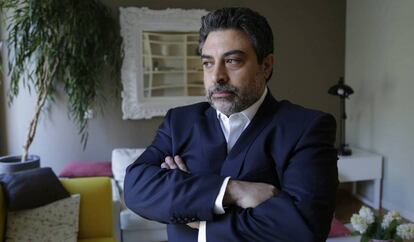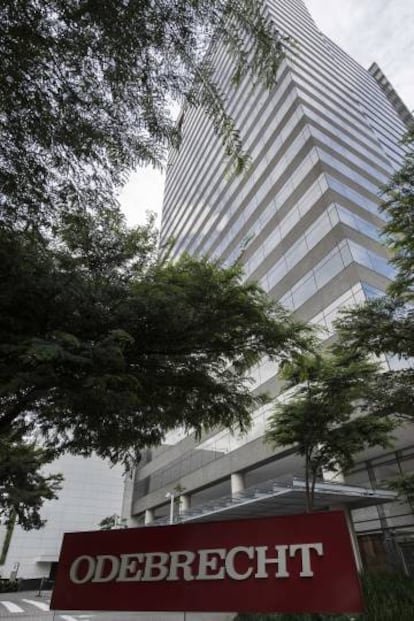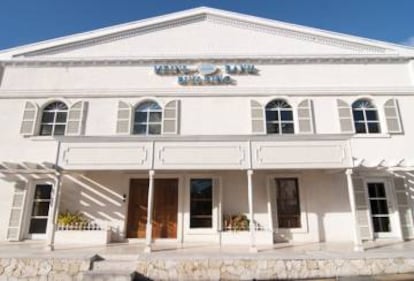Lawyer at center of Odebrecht scandal: “The company bribed more than 1,000 people”
In an exclusive interview with EL PAÍS, the former attorney reveals the key workings of the scheme, which saw millions in commissions paid to the governments of 12 countries
Rodrigo Tacla has become a ticking time bomb. Now one of the men most feared by presidents and high-ranking officials in Latin America, the 44-year-old lawyer is privy to many of the secrets of Odebrecht, the Brazilian construction giant that has brought the political foundations of the continent crashing down after confirming the payment of millions of euros in bribes to the governments of 12 countries.

Until 2016, Tacla worked as a lawyer at the company’s Structured Operations Department, the secretive business unit that specialized in buying goodwill. Election campaigns, gifts, parties, prostitutes… There were no limits when it came to securing the favors of politicians. In return, presidents and heads of state would sign public works contracts, the main source of income for the biggest construction company in Latin America, a giant with 168,000 employees and tentacles that reached into 28 countries.

EL PAÍS has located Tacla, who has Spanish-Brazilian nationality, in Madrid. He was arrested in November after an order was issued by a court in Curitiba, Brazil. After spending 72 days in the Spanish prison of Soto del Real – accused of bribery, money laundering and belonging to a criminal organization – he is now out, on conditional release. Tacla will be tried in Spain after the Spanish High Court, the Audiencia Nacional, rejected his extradition to his country of birth, Brazil.
The Brazilian justice system accuses him of laundering more than €12 million on the orders of his company. Furthermore, Odebrecht claims that he was hired to launder illegal commissions. Tacla denies this, claiming that he only lent his services for five years, and that he knows about the company’s illegal activities because he “evaluated risks” as a lawyer in the countries where the construction company had bought off dozens of politicians.
In this, his first interview, Tacla, who is now cooperating with the US Department of Justice and the Spanish corruption prosecutor, reveals the details about the biggest corruption scandal in the Americas. It’s a political time bomb packed with shrapnel that has already impacted presidents Michel Temer (Brazil), Juan Manuel Santos (Colombia) and Danilo Medina (Dominican Republic), along with former leaders Ollanta Humala (Peru) and Luiz Inácio Lula da Silva (Brazil).
Question. How did Odebrecht operate?
Answer. The construction company found solutions by paying. It would pay commissions to the lowest-ranking civil servant, up to the head of state.
Q. And how did it get close to the seats of power?
A. The first contact would be established during the election campaign. Odebrecht would pick up the costs of the political marketing of the candidates. It had an agreement with a publicist called João Santana [responsible for the successful campaigns of Brazilian ex-presidents Luiz Inácio Lula da Silva and Dilma Rousseff]. The construction company would later suggest the public works that would be included in the government’s plans.
Q. The politician would return the favor when they got to power…
A. Yes. The leader would include projects of interest to Odebrecht in their government plans. The construction company, in some cases, would advise countries on how to secure financing through organizations such as the World Bank or the Inter-American Development Bank (BID).
Anyone from public company managers to heads of state would be paid
Q. How many civil servants, candidates and presidents did Odebrecht bribe?
A. More than 1,000. Via the firm, anyone from public company managers to heads of state would get paid. In Brazil alone there are 500 people affected by this. And there are politicians and high-ranking civil servants in Brazil whose names have still not come out.
Q. Odebrecht paid the biggest fine in history in 2016: €2.2 billion to the governments of Brazil, Switzerland and the United States so it could bid for public tenders once more. With this agreement, the construction company admitted that since 2001 it had paid bribes in 12 different countries. Are you aware of the involvement of any more states?
A. Yes. For example, the company paid €3 million in January 2016 to the prime minister of Antigua and Barbuda, Gaston Browne. The payment was made via the diplomat from this country, Casroy James. The money was to stop Antigua and Barbuda from telling the judicial authorities in Brazil about the movements in Meinl Bank, a local lender acquired by Odebrecht that was used to launder the funds from bribes.

Although Browne was paid €3 million, the operation cost Odebrecht €10.5 million. Most of this money ended up in the pockets of a number of directors from the construction company and from Meinl Bank. The decision [to pay the alleged bribe to Browne] was taken in September 2015, during a meeting at the Hotel Intercontinental in Madrid, at which I was present.
[Browne told EL PAÍS that he had not received a bribe from Odebrecht. He stressed that he had never offered beneficial treatment to the builder and insisted that he was collaborating with Brazilian authorities in their investigation].
Via internal payments there was no trail, and it avoided the traces of funds when a SWIFT code is included
Q. Can you explain the mission of this small bank in Antigua and Barbuda?
A. Meinl Bank was a front in this Caribbean tax haven. It had just three employees in a small office. Its headquarters in São Paulo was in the consulate. It was the nerve center from where irregular payments were made. Money was transferred from there to other banks such as the Andorra Private Bank [BPA], a lender that was closed in 2015 due to corruption. Via internal payments there was no trail, and it avoided the traces of funds when a SWIFT [international transfer code] is included.
Q. What role in the money-laundering structure did BPA and its affiliate in Spain, Banco Madrid, play?
A. The BPA was the bank in charge of the final payments. Odebrecht would open accounts at this lender in the name of Politically Exposed Persons [PEPs], public figures susceptible to laundering money. The construction company ordered transfers to the BPA from its bank in Antigua and Barbuda. Afterwards the money in BPA would be transferred via internal movements – off the books – to the accounts of the beneficiaries.
The Spanish connection
Question. The anti-corruption prosecutor is investigating public works projects in Latin America by Spanish constructors who participated in consortia with Odebrecht. Companies such as Acciona, which participated in the Quito Metro (€1.4 billion), and FCC, which was involved in the Panama subway (€1.65 billion), are under suspicion. What was the role in these companies?
Answer. I can't go into detail because I am working with the Spanish anti-corruption prosecutor. I can tell you that the prosecutor asked me if I was interested in supplying information to Panama. I answered saying that I had no problem, provided the collaboration followed legal channels. I can't accept the Panama public prosecutor contacting the Spanish authorities in an informal [extrajudicial] manner. When I asked for any collaboration with this country to be official, they never called me back.
Q. Why would Panama not want to follow the conventional route of judicial collaboration?
A. The answer lies in the friendship between the head of the Odebrecht affiliate in Panama, André Rabello, with the president of the country, Juan Carlos Varela. They want to know what I am saying in Spain, what steps I am taking.
Q. How much did the company spend each year on illegal commissions?
A. Close to €260 million. The money was moved in cash, via accounts in tax havens and through international transfers. The construction company, for security, would never pay in the beneficiaries’ countries of origin. And it would use Meinl Bank to send funds to PEPs, which is how those in public office susceptible to committing money laundering were known. That’s how it got money to Michelle Lasso, someone who was close to the president of Panama, Juan Carlos Varela.
[An official spokesperson for President Varela told this newspaper that his government had expressed its support for the investigations of the public prosecutor of that country and had made public, for the first time, details of the donations received for his campaign].
Q. How many companies did Odebrecht manage in tax havens?
A. More than a hundred. I joined the construction company in 2011. But the structure had already existed since 2006.
Q. The president of the company, Marcelo Odebrecht, has been sentenced to 19 years in jail. Together with him, another 77 employees worked with the Brazilian public prosecutor in exchange for reduced sentences. Odebrecht has admitted the payment of €677 million in bribes. Is that figure correct?
A. No. A former director at Meinl Bank stated that the lender moved €2.2 billion. And this bank worked exclusively for Odebrecht. It didn’t have normal clients.
Q. In Brazil, Odebrecht has recognized the payment of €303 million in bribes to receive contracts for works valued at €1.6 billion during the presidencies of Luiz Inácio Lula da Silva and Dilma Rousseff…
A. The amount was much greater. €130 million a year was spent on commissions. The money was handed over in cash and via transfer. Even the janitor got paid. The bribes affected all the parties. From the right, the left… From the government, opposition… And there are not just politicians among the beneficiaries… The company would take sides. For example, in the contest between Lula and Dilma, Odebrecht preferred Lula.
A former director at Meinl Bank stated that the lender moved €2.2 billion. And this bank worked exclusively for Odebrecht
Q. What can you tell us about Mexico?
A. That Odebrecht thought that the president of Mexico was going to be the former general director of the state oil company Pemex, Emilio Lozoya Austin. And it liked that idea. The construction company was very interested in Lozoya.
Q. Have you received threats in the US or in Spain?
A. Yes, via phone and social networks. I am being told to keep quiet. My mother has also been threatened. I have reported the situation to the authorities in Spain and the US.
[Tacla shows a WhatsApp message from his mother with the following text: “Son, they are threatening me by telephone. They say that they have you tied up. That this is a robbery. That they want jewels, money, to free you...It’s 3am…].
Q. Do you think that senior officials and leaders in Latin America are afraid of your confession?
A. Without a doubt. My testimony could affect a lot of powerful people throughout the world.
Tacla: “I never paid politicians. Never”
Rodrigo Tacla is being accused of having laundered more than €12 million in five years for Odebrecht. According to the directors at the Brazilian company UTC, which is caught up in the so-called Petrobras case, the lawyer set up a number of different companies to launder funds from the construction company that were paid in bribes.
Tacla says he can account for the every cent of his assets, explaining that he is working with the Swiss authorities to justify his accounts in that country. He adds that his biggest account, €13 million in a Singapore bank, came from the sale of a telephony business. He adds that Odebrecht paid him €7.7 million over six years for his services as a lawyer. Tacla, whose father and grandfather were from the Spanish northwestern region of Galicia, has had Spanish nationality since 1994.
Question. You were arrested in a hotel in Madrid in November 2016, two days after landing in Spain. You were arrested on a court order from Brazil, which accused you of bribery, money laundering and belonging to a criminal organization. Why did you come to Madrid?
Answer. I didn't flee Brazil. I came to Madrid to attend a tax inspection of my two Spanish companies. After the Odebrecht case blew up, the authorities in Brazil and the construction company tried to pressure me into signing up to the deal, a document that 78 directors from the company subscribed to and that involved admitting offenses in exchange for a reduced sentence and a fine. In my case: six months of house arrest with a bracelet, community service and a fine of up to €12 million. Odebrecht offered to pay me 15 years' salary if I accepted the deal. I refused on a point of principle. While I was talking to the Justice Department in Washington, Brazil was calling for my arrest in July and September 2016. The US, however, did not arrest me. I don't want to betray anyone.
Q. The High Court has decided not to extradite you to Brazil. Why stay in Spain?
A. The prosecutors in Spain want me to recognize crimes that I didn't commit. They have not respected my rights as a lawyer. What's more, they want to attribute crimes to me due to information that I collected in my role as a lawyer. They are accusing me of crimes with no proof, based on statements. There has been no police investigation.
Q. What role did your nine companies play in the payment of commissions?
A. None. I never paid politicians. Ever.
Q. One of your companies in Spain, Vivosant, received in 2010 a total of €10 million from a company linked to Odebrecht via the Pictet bank in Singapore. What do you have to say about that?
A. That's false. That amount corresponds to the sale of a telephony company. I have given all the details of the payment to the Spanish anti-corruption prosecutor.
English version by Simon Hunter.
Tu suscripción se está usando en otro dispositivo
¿Quieres añadir otro usuario a tu suscripción?
Si continúas leyendo en este dispositivo, no se podrá leer en el otro.
FlechaTu suscripción se está usando en otro dispositivo y solo puedes acceder a EL PAÍS desde un dispositivo a la vez.
Si quieres compartir tu cuenta, cambia tu suscripción a la modalidad Premium, así podrás añadir otro usuario. Cada uno accederá con su propia cuenta de email, lo que os permitirá personalizar vuestra experiencia en EL PAÍS.
¿Tienes una suscripción de empresa? Accede aquí para contratar más cuentas.
En el caso de no saber quién está usando tu cuenta, te recomendamos cambiar tu contraseña aquí.
Si decides continuar compartiendo tu cuenta, este mensaje se mostrará en tu dispositivo y en el de la otra persona que está usando tu cuenta de forma indefinida, afectando a tu experiencia de lectura. Puedes consultar aquí los términos y condiciones de la suscripción digital.








































